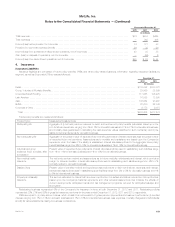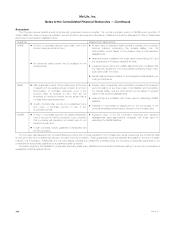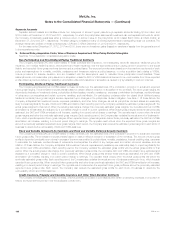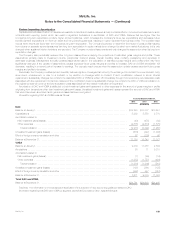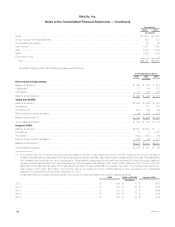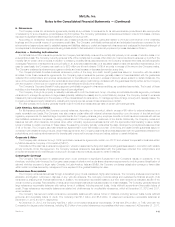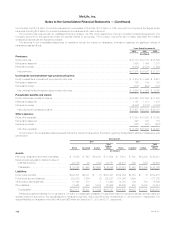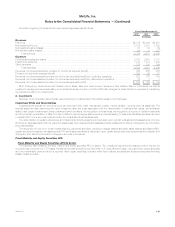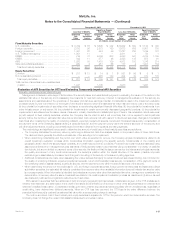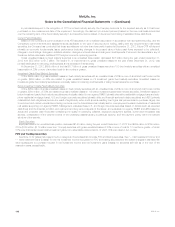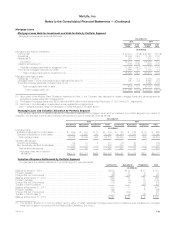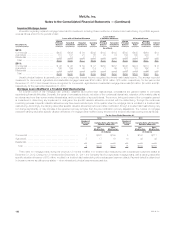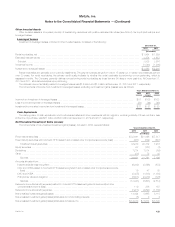MetLife 2012 Annual Report Download - page 119
Download and view the complete annual report
Please find page 119 of the 2012 MetLife annual report below. You can navigate through the pages in the report by either clicking on the pages listed below, or by using the keyword search tool below to find specific information within the annual report.MetLife, Inc.
Notes to the Consolidated Financial Statements — (Continued)
7. Closed Block
On April 7, 2000 (the “Demutualization Date”), MLIC converted from a mutual life insurance company to a stock life insurance company and became
a wholly-owned subsidiary of MetLife, Inc. The conversion was pursuant to an order by the New York Superintendent of Insurance approving MLIC’s
plan of reorganization, as amended (the “Plan”). On the Demutualization Date, MLIC established a closed block for the benefit of holders of certain
individual life insurance policies of MLIC. Assets have been allocated to the closed block in an amount that has been determined to produce cash flows
which, together with anticipated revenues from the policies included in the closed block, are reasonably expected to be sufficient to support obligations
and liabilities relating to these policies, including, but not limited to, provisions for the payment of claims and certain expenses and taxes, and to provide
for the continuation of policyholder dividend scales in effect for 1999, if the experience underlying such dividend scales continues, and for appropriate
adjustments in such scales if the experience changes. At least annually, the Company compares actual and projected experience against the
experience assumed in the then-current dividend scales. Dividend scales are adjusted periodically to give effect to changes in experience.
The closed block assets, the cash flows generated by the closed block assets and the anticipated revenues from the policies in the closed block
will benefit only the holders of the policies in the closed block. To the extent that, over time, cash flows from the assets allocated to the closed block
and claims and other experience related to the closed block are, in the aggregate, more or less favorable than what was assumed when the closed
block was established, total dividends paid to closed block policyholders in the future may be greater than or less than the total dividends that would
have been paid to these policyholders if the policyholder dividend scales in effect for 1999 had been continued. Any cash flows in excess of amounts
assumed will be available for distribution over time to closed block policyholders and will not be available to stockholders. If the closed block has
insufficient funds to make guaranteed policy benefit payments, such payments will be made from assets outside of the closed block. The closed block
will continue in effect as long as any policy in the closed block remains in-force. The expected life of the closed block is over 100 years.
The Company uses the same accounting principles to account for the participating policies included in the closed block as it used prior to the
Demutualization Date. However, the Company establishes a policyholder dividend obligation for earnings that will be paid to policyholders as additional
dividends as described below. The excess of closed block liabilities over closed block assets at the Demutualization Date (adjusted to eliminate the
impact of related amounts in accumulated other comprehensive income) represents the estimated maximum future earnings from the closed block
expected to result from operations attributed to the closed block after income taxes. Earnings of the closed block are recognized in income over the
period the policies and contracts in the closed block remain in-force. Management believes that over time the actual cumulative earnings of the closed
block will approximately equal the expected cumulative earnings due to the effect of dividend changes. If, over the period the closed block remains in
existence, the actual cumulative earnings of the closed block are greater than the expected cumulative earnings of the closed block, the Company will
pay the excess of the actual cumulative earnings of the closed block over the expected cumulative earnings to closed block policyholders as additional
policyholder dividends unless offset by future unfavorable experience of the closed block and, accordingly, will recognize only the expected cumulative
earnings in income with the excess recorded as a policyholder dividend obligation. If over such period, the actual cumulative earnings of the closed
block are less than the expected cumulative earnings of the closed block, the Company will recognize only the actual earnings in income. However, the
Company may change policyholder dividend scales in the future, which would be intended to increase future actual earnings until the actual cumulative
earnings equal the expected cumulative earnings.
Experience within the closed block, in particular mortality and investment yields, as well as realized and unrealized gains and losses, directly impact
the policyholder dividend obligation. Amortization of the closed block DAC, which resides outside of the closed block, is based upon cumulative actual
and expected earnings within the closed block. Accordingly, the Company’s net income continues to be sensitive to the actual performance of the
closed block.
Closed block assets, liabilities, revenues and expenses are combined on a line-by-line basis with the assets, liabilities, revenues and expenses
outside the closed block based on the nature of the particular item.
MetLife, Inc. 113


